(完整)五年级英语一般疑问句和特殊疑问句知识精讲
(完整版)小学英语四种基本句型肯定句否定句、一般疑问句与特殊疑问句
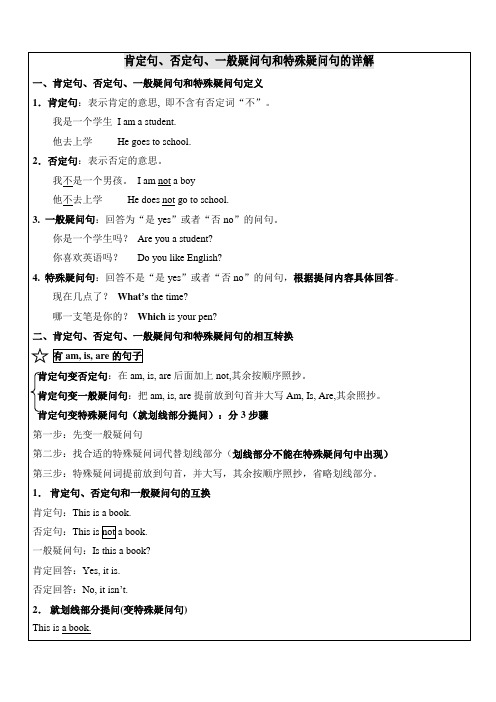
3、A: _______ is the diary????????????? B:It’s under the chair. 4、A: _______ is the Chirstmas Day????? B: It’s on the 25th of December.
5、A: _______ are the earphones?????????B:They are 25 yuan. 6、A: _______ is the hairdryer???????????B:It’s blue. 7、A: _______ is it today???????????????B:It’s Sunday. 8、A: _______ was it yesterday????????? B: It was the 13th of October. 9、A: _______ this red one?????????????B:It’s beautiful. 10、A: _______ is it from here????????? B:It’s about two kilometres away. 11、A: Can I have some paper and some crayons?
2.and 变为 or
I have a knife and a ruler.→I don't have a knife or a ruler. 3.a lot of (=lots of)变为 many 或 much
They have a lot of friends.(可数名词)→They don't have many friends.
否定句:He does not like English.
2.就划线部分提问(变特殊疑问句)
(完整版)英语一般疑问句和特殊疑问句的讲解及练习

一般疑问句用be动词(am /is主语+其他成分,+主语+提问的词.否定:No,+主语+提问的词+not.Are you from Japan﹖Yes ,I am./ No, I'm not.Is her sister doing her homework now﹖Yes, she is./ No, she isn't.Does he work in a bank﹖Yes, he does./ No, he doesn't.Can you speak French﹖Yes, I can./ No, I can't.一: 般疑问句还有下列特点:1、以be动词、助动词或情态动词开头;例:Is your father a teacher? Does Catherine like animals? Can Jenny speak French?二: 如何将陈述句变成一般疑问句?1.如句中有be 动词(am、is、are、was、were can、may、must …)或助动词(do、does、did、have、had(完成时中))时,可直接将它们提到句首,句末打上问号即可。
主语为第一人称,应将其改为第二人称。
例:It was rainy yesterday.→Was it rainy yesterday?Tom's father can play the piano.→Can Tom's father play the piano?I have finished my homework.→Have you finished your homework?2.如果句中没有be动词、助动词或情态动词,则根据谓语动词的形式借助do的相应形式放在句首。
具体方法是:如果谓语动词是原形,则借do;如果谓语动词是一般现在时第三人称单数形式,则借does;如果谓语动词是过去式,则借did. 需要注意的是,借does或did后,原句的谓语动词要变回原形。
一般疑问句、特殊疑问句、选择疑问句、反义疑问句地详细用法
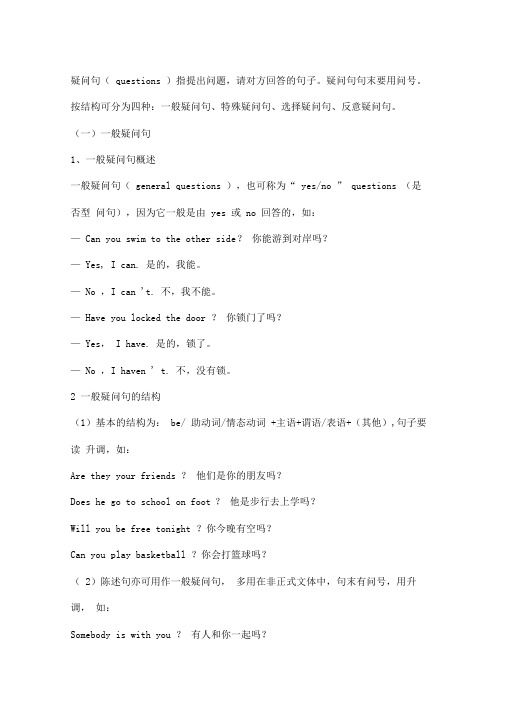
疑问句( questions )指提出问题,请对方回答的句子。
疑问句句末要用问号。
按结构可分为四种:一般疑问句、特殊疑问句、选择疑问句、反意疑问句。
(一)一般疑问句1、一般疑问句概述一般疑问句( general questions ),也可称为“ yes/no ” questions (是否型问句),因为它一般是由 yes 或 no 回答的,如:— Can you swim to the other side ?你能游到对岸吗?— Yes, I can. 是的,我能。
— No ,I can 't. 不,我不能。
— Have you locked the door ?你锁门了吗?— Yes, I have. 是的,锁了。
— No ,I haven ' t. 不,没有锁。
2 一般疑问句的结构(1)基本的结构为: be/ 助动词/情态动词 +主语+谓语/表语+(其他),句子要读升调,如:Are they your friends ?他们是你的朋友吗?Does he go to school on foot ?他是步行去上学吗?Will you be free tonight ?你今晚有空吗?Can you play basketball ?你会打篮球吗?( 2)陈述句亦可用作一般疑问句,多用在非正式文体中,句末有问号,用升调,如:Somebody is with you ?有人和你一起吗?He didn ' t finish the work ?他没有做完活吗?You are fresh from America , I suppose ?我猜,你刚从美国回来吧?3、一般疑问句的答语( 1)一般疑问句一般由 yes 或 no 来回答,如:— Are you tired ?你累了吗?— Yes,I am. 是的 ,累了。
— No, I ' m not. 不,不累。
— Does she do the cleaning ?她扫除了吗?— Yes , she does. 是的,她打扫了。
小学英语特殊疑问句和一般疑问句的归纳

特殊疑问句和一般疑问句的答法一般疑问句通常都是 1..以be (am,is,are,)开头2.以Do,Does,Did 开头或以Can开头回答方法:前面用什么提问的就用什么答。
只有两种回答方式:1)肯定的, Yes,主语 + 提问词.2)否定的 No,主语+提问词+not.【注意:问句与答句的第一二人称要互换】如:④主语是名字时的答语:看性别,男的用he ,女的用she ,其他的用it 复数就用they。
如:①Is she…… Is he……… Is it……..Yes, she is. Yes, he is. Yes, it is.No, she isn,t. No, he isn,t. No, it isn,t.②Are they……… Are the monkeys …….Yes, they are. Yes, they are.No,they aren’t No,they aren’t③ Do they……… Does he…….. Did she…….Yes,they do. Yes,he does. Yes, she did.No,they don’t. No,he doesn’t. No,she didn’t.④Are you…….. Are you…….. Do you…….Yes, I am. Yes, we are. Yes ,I do. 或 Yes,No, I am not. No, we aren’t. No,I don’t. 或No,⑤Does Mike……. Is ChenJi….. Do your parents…Yes ,he does. Yes , she is. Yes, they do.No,he doesn’t. No, she isn’t. No,they don’t.111v1.0 可编辑可修改一、专项练习。
1. Did ChenJie read books yesterday2. Can the girl cook the meals—————————————————————————————he going to swim this afternoon 4. Are they going to take a trip next weekend ————————————————————————————————5.Does he often go to school by bike 6. Do you play basketball every weekend ———————————————————————————————————7. Did Mike do his homework yesterday 8. Are they playing basketball now————————————————————————————————一般疑问句及特殊疑问句的总结一般疑问句的定义:用yes或no来回答的疑问句叫一般疑问句。
(完整版)小学英语四种基本句型肯定句否定句、一般疑问句与特殊疑问句
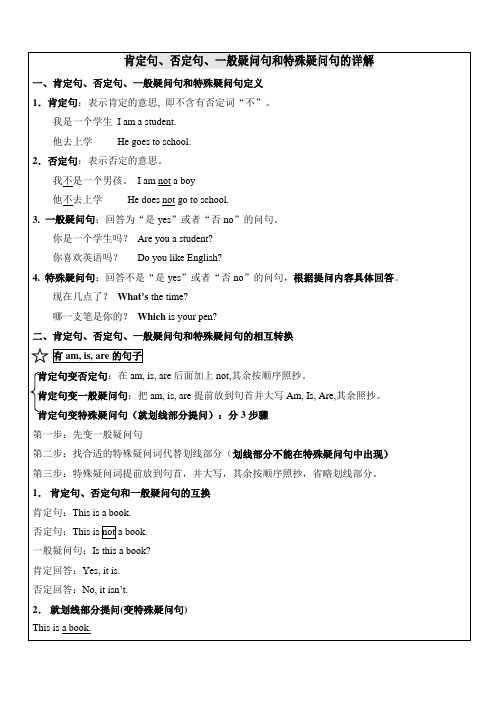
类别 陈述句
疑问句
用法
标点
肯定 叙述一件事情或
说明说话人的看法
.
否定
一般 用于提出问题
?
特殊 用于提出问题
?
选择
用于提出问题
?
反意
用于提出问题
?
例句 This is a bag. That's my book. I can see a bag over there. I don't know. Are you a student? Do you like puppets? Can you speak English? What's your name? Where's my bag? How many trees are there?
Is your friend a boy or a girl?
It's a fine day, isn't it?
祈使句 感叹句
特殊:
表示命令或请求、建议
表示惊讶\赞美\愤怒 等强烈情感
.或! !
Put it here! Look at the noticeboard.
How smart! Glad to see you! What a nice pencil case!
why 为什么 问原因 what 什么 问东西 what time 什么时间 问时间 what colour 什么颜色 问颜色 what about…怎么样 问意见 what day 星期几 问星期
三.句子的种类
how much 多少 问价钱 how about …怎么样 问意见 how far 多远 问路程 how long 多长 问时间 How soon 多快,多久 问时间 How often 多久 问频率
小学英语一般疑问句和特殊疑问句(附练习题)
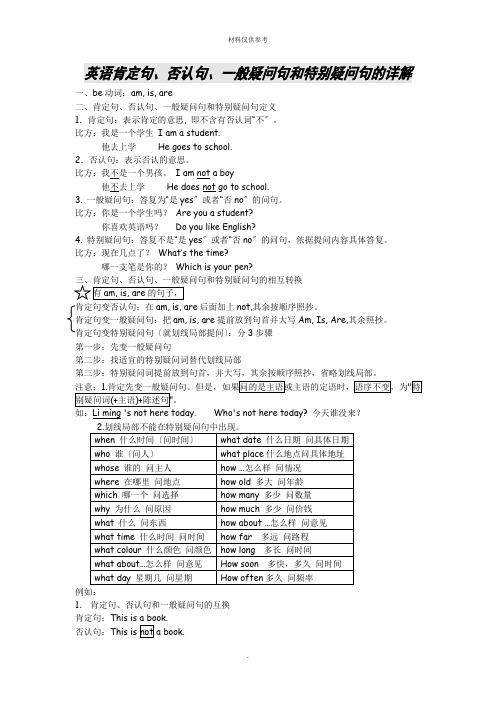
英语肯定句、否认句、一般疑问句和特别疑问句的详解一、be动词:am, is, are二、肯定句、否认句、一般疑问句和特别疑问句定义1.肯定句:表示肯定的意思, 即不含有否认词“不〞。
比方:我是一个学生I am a student.他去上学He goes to school.2.否认句:表示否认的意思。
比方:我不是一个男孩。
I am not a boy他不去上学He does not go to school.3. 一般疑问句:答复为“是yes〞或者“否no〞的问句。
比方:你是一个学生吗?Are you a student?你喜欢英语吗?Do you like English?4. 特别疑问句:答复不是“是yes〞或者“否no〞的问句,依据提问内容具体答复。
比方:现在几点了?What’s the time?哪一支笔是你的?Which is your pen?am, is, are后面加上not,其余按顺序照抄。
肯定句变一般疑问句:把am, is, are提前放到句首并大写Am, Is, Are,其余照抄。
:分3步骤第一步:先变一般疑问句第二步:找适宜的特别疑问词替代划线局部第三步:特别疑问词提前放到句首,并大写,其余按顺序照抄,省略划线局部。
如:Li ming 's not here today.Who's not here today? 今天谁没来?例如:1.肯定句、否认句和一般疑问句的互换肯定句:否认句:一般疑问句:Is this a book?肯定答复:Yes, it is.否认答复:No, it isn’t.2.就划线局部提问(变特别疑问句)This is a book.第一步:变一般疑问句Is this a book?第二步:找适宜的特别疑问词Is this what ?第三步:特别疑问词提前放到句首,并大写,其余按顺序照抄,省略划线局部。
do not或者does not,其余按顺序照抄动词用原形肯定句变一般疑问句:在句首加do或者does并大写,其余照抄。
五下特殊疑问句和一般疑问句整理复习

五年级下册英语复习(三)特殊疑问句与一般疑问句的整理复习班级________ 姓名________一、特殊疑问句:根据句子开头的疑问词含义来进行回答。
1.when—问时间1)--When do you get up? 你什么时候起床?--I usually get up at 6:30。
我通常6:30起床. 频度副词:always 总是,一直usually通常,常常often 经常sometimes 有时候2)——When is your birthday? 你的生日什么时候?——My birthday is in February. / It is in February. 我的生日在二月.——It’s (on) February 23rd . 2月23日.(生日在哪个月份,用in;具体到某一天,用on 或省略)3)——When is your father’s birthday? 你爸爸的生日什么时候?—-His birthday is Feb。
18th。
他的生日是2月18日。
注意:his 他的her 她的2.what—什么1)--What’s your favourite season?= Which season do you like best? 你最喜欢那个季节?-—Winter./ I like winter best。
/Winter is my favourite season.. 我最喜欢冬天。
(三种回答方式)—-Why do you like winter?你为什么喜欢冬天?—-Because I can play with snow. 因为我可以玩雪.注意:play with snow 玩雪,play in the snow在雪中玩.2)--What’s the weather like in spring in Hang Zhou?杭州春天的天气怎么样?-—It’s always rainy。
小学英语一般疑问句和特殊疑问句(附练习题)
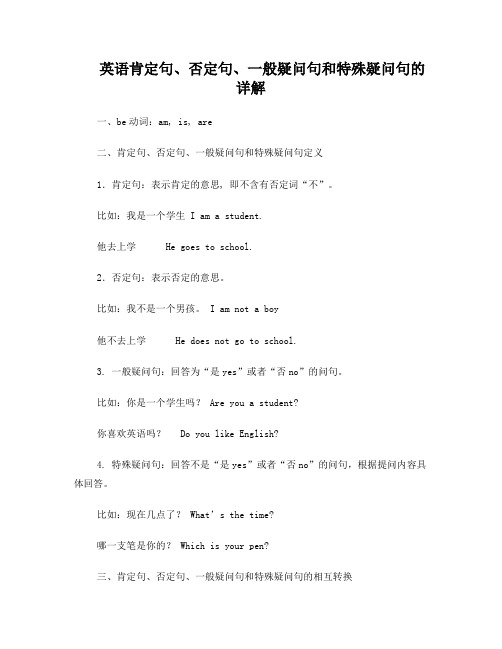
英语肯定句、否定句、一般疑问句和特殊疑问句的详解一、be动词:am, is, are二、肯定句、否定句、一般疑问句和特殊疑问句定义1.肯定句:表示肯定的意思, 即不含有否定词“不”。
比如:我是一个学生 I am a student.他去上学 He goes to school.2.否定句:表示否定的意思。
比如:我不是一个男孩。
I am not a boy他不去上学 He does not go to school.3. 一般疑问句:回答为“是yes”或者“否no”的问句。
比如:你是一个学生吗? Are you a student?你喜欢英语吗? Do you like English?4. 特殊疑问句:回答不是“是yes”或者“否no”的问句,根据提问内容具体回答。
比如:现在几点了?What’s the time?哪一支笔是你的? Which is your pen?三、肯定句、否定句、一般疑问句和特殊疑问句的相互转换有am, is, are的句子,肯定句变否定句:在am, is, are后面加上not,其余按顺序照抄。
肯定句变一般疑问句:把am, is, are提前放到句首并大写Am, Is, Are,其余照抄。
肯定句变特殊疑问句(就划线部分提问):分3步骤第一步:先变一般疑问句第二步:找合适的特殊疑问词代替划线部分第三步:特殊疑问词提前放到句首,并大写,其余按顺序照抄,省略划线部分。
注意:1.一定先变一般疑问句。
但是,如果问的是主语或主语的定语时,语序不变,为"特殊疑问词(+主语)+陈述句"。
如:Li ming 's not here today. Who's not here today? 今天谁没来?2.划线部分不能在特殊疑问句中出现。
when 什么时间(问时间)what date 什么日期问具体日期who 谁(问人)what place什么地点问具体地址whose 谁的问主人how …怎么样问情况where 在哪里问地点how old 多大问年龄which 哪一个问选择how many 多少问数量例如:1.肯定句、否定句和一般疑问句的互换肯定句:This is a book.否定句:This is not a book.一般疑问句:Is this a book?肯定回答:Yes, it is.否定回答:No, it isn’t.2.就划线部分提问(变特殊疑问句)This is a book.第一步:变一般疑问句 Is this a book?第二步:找合适的特殊疑问词 Is this what ?第三步:特殊疑问词提前放到句首,并大写,其余按顺序照抄,省略划线部分。
五年级下册英语,1到10模块,特殊疑问句,一般疑问句,总结(一)
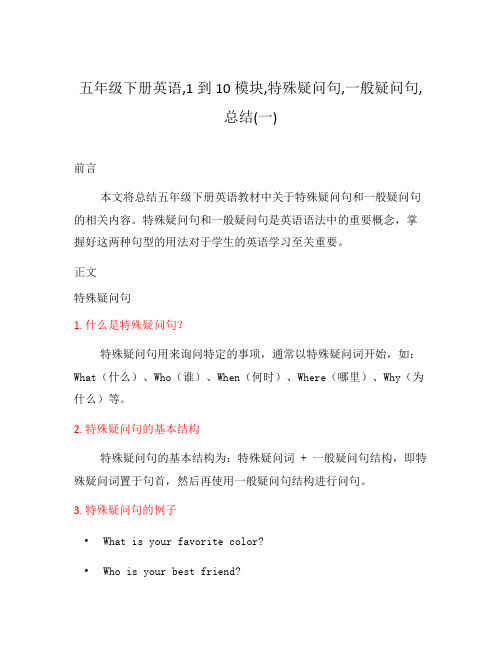
五年级下册英语,1到10模块,特殊疑问句,一般疑问句,总结(一)前言本文将总结五年级下册英语教材中关于特殊疑问句和一般疑问句的相关内容。
特殊疑问句和一般疑问句是英语语法中的重要概念,掌握好这两种句型的用法对于学生的英语学习至关重要。
正文特殊疑问句1. 什么是特殊疑问句?特殊疑问句用来询问特定的事项,通常以特殊疑问词开始,如:What(什么)、Who(谁)、When(何时)、Where(哪里)、Why(为什么)等。
2. 特殊疑问句的基本结构特殊疑问句的基本结构为:特殊疑问词 + 一般疑问句结构,即特殊疑问词置于句首,然后再使用一般疑问句结构进行问句。
3. 特殊疑问句的例子•What is your favorite color?•Who is your best friend?•When is your birthday?•Where do you live?•Why are you crying?一般疑问句1. 什么是一般疑问句?一般疑问句用于询问是否某种情况存在,通常以be动词或助动词开头,并用词序上的倒装,即将助动词或be动词置于主语之前。
2. 一般疑问句的基本结构一般疑问句的基本结构为:助动词/Be动词 + 主语 + 其他+ ?,即将助动词或be动词置于主语之前,并使用各种时态的一般疑问句结构进行问句。
3. 一般疑问句的例子•Are you a student?•Is she playing basketball?•Can you swim?•Will they come tomorrow?•Have you finished your homework?结尾特殊疑问句和一般疑问句是英语语法中非常重要的句型,它们在日常交流中经常被使用到。
通过学习和掌握特殊疑问句和一般疑问句的用法,学生可以更流利地使用英语进行提问和回答。
希望本文对同学们的英语学习有所帮助。
特殊疑问句的练习以下是一些练习题,帮助你巩固特殊疑问句的用法。
语法点一般疑问句和特殊疑问句讲解

一般疑问句一、什么是一般疑问句1.定义:用Yes或No作答的疑问句叫一般疑问句;2.特点:1、以be动词、助动词或情态动词开头;eg: Is your father a teacherDoes Catherine like animalsCan Jenny speak French2、往往读升调;3、译成汉语,都可以带上“吗”eg: 上面三句可分别译为:你父亲是老师吗凯瑟琳喜欢动物吗詹妮会说法语吗二.陈述句和一般疑问句间的转换要将陈述句变成一般疑问句,可以遵循下列步骤:1.看句中有没有be动词am、is、are、was、were助动词do、does、did、have、had或情态动词can、must、will、may等,如果有,将其提到句首,句末打上问号即可;eg: It was rainy yesterday.→Was it rainy yesterdayTom's father can play the piano.→Can Tom's father play the pianoI have finished my homework.→Have you finished your homework2.如果句中没有be动词、助动词或情态动词,则根据谓语动词的形式借助do的相应形式放在句首;具体方法是:如果谓语动词是原形,则借do;如果谓语动词是一般现在时第三人称单数形式,则借does;如果谓语动词是过去式,则借did. 需要注意的是,借does或did后,原句的谓语动词要变回原形;eg:They go to school by bike.→Do they go to school by bikeBill gets up at 6:30 every day.→Does bill gets up at 6:30 every dayThe students saw a film yesterday.→Did the students see a film yesterday陈述句变一般疑问句应注意的事项陈述句变成一般疑问句除了遵循上述规则以外,还应注意下列几点:1.如果陈述句中有第一人称,则变问句时最好要变为第二人称;eg:I usually have lunch at school.→Do you usually have lunch at schoolMy father is playing soccer.→Is your father playing soccer2.如果陈述句中有some, 则变问句时往往要变成any ;eg:There is some water on the playground.→Is there any water on the playground3.复合句变一般疑问句通常只变主句,从句不变;eg:I know he comes from Canada.→Do you know he comes from Canada三.一般疑问句往往采用简短回答由三部分三个单词组成,对这三部分三个单词的确定可以概括例下:1.第一个词:不是Yes就是No;有时根据语气的不同,Yes可由Sure, Certainly, Of course等代替.NO可由sorry 代替.2.第二个词:问谁答谁;即答语中的主语须与问句的主语一致但必须用主格代词;eg:Does she clean her room every day Yes, she does.Is Anna′s father a doctor No,he isn′t.如果主语是this that,回答时用it 代替,如果问句中主语these, those, 回答时用they′ 代替;3.第三个词:用什么问,用什么答;即沿用问句中的引导词;Can Jim play soccer Yes, he can.Does Mr Bean speak English Yes, he does.需要注意问题:1.用may 引导的问句,肯定回答用may,否定回答用can′t 或mustn′t用must 引导的问句,肯定回答用must,否定回答用needn′t.eg:May I go to the park nowYes, you may. /No, you mustn′t.Must I wash my clothes nowYes, you must. /No, you needn′t.4.用No开头作否定回答时,结尾要加上not;因为回答必须是三部分, 所以否定回答必须缩写,而肯定回答不能缩写;eg:Did Thomas come here yesterdayYes, he did./ N o ,he didn′t.Is Lin Lin in Class 3Yes, she is. / No, she isn′t.或No, she′s not.一般疑问句练习题1. His father is an English teacher.2. These cats are crying.3. They can swim.4. I like to read English.5. I go to school on foot.6. He likes English.7. His father goes to work by bus.8. He is crying under the tree.9. His birthday is on the twentieth of November.10. Mrs. Li and Kitty are in a big shop.11. Kitty is wearing her new uniform.12. The boy under the tree is hungry.13. He goes to school every day.15. I want to have a model car.16. She wants a cup of coffee.17. Mrs. Li and Kitty watch television at night.18. I do my homework after school.特殊疑问句一. 定义:以疑问词开头,对句中某一成分提问的句子叫特殊疑问句;常用的疑问词有:what, what color, what nationality, what day, who 二.构成①特殊疑问词+助动词+主语+动词原形+其他eg:Where do you do study English②特殊疑问词+be动词+主语+其他eg:Why is your Mum so angry③特殊疑问词+情态动词+主语+动词原形+其他eg:What can I do for you三.回答特殊疑问句时,不能用yes /no,即问什么答什么,尤其是简略回答;如:-Who is from Canada﹖-Helen is.- Where's the restaurant﹖- Near the station.-Why do you like koalas﹖-Because they are cute.单词意思用法when什么时间问时间who谁问人whose谁的问主人where在哪里问地点which哪一个问选择why为什么问原因what什么问东西what time什么时间问时间what colour什么颜色问颜色what about…怎么样问意见what day星期几问星期what date什么日期问具体日期what for为何目的问目的how…怎么样问情况how old多大问年龄how many多少问数量how much多少问价钱how about…怎么样问意见how far多远问路程特殊疑问句练习题一1._____ is that pretty girl She is my sister.2.._____ are Jack and Tom They are behind you.do you go to school I go to school from Monday to Friday.has a beautiful flower John has a beautiful flower.are they They are my parents.is my mother She is in the living room.are you going We are going to the bakery面包坊.do Jim and Wendy play ball They play ball in the afternoon.does he jog He jogs in the park.are you from I'm from Changchun city.1、A: _______ is the boy in blueB:He’s Mike.2、A: _______ wallet is it B:It’s mine.3、A: _______ is the diary B:It’s under the chair.4、A: _______ is the Chirstmas Day B: It’s on the 25th of December.5、A: _______ are the earphonesB:They are 25 yuan.6、A: _______ is the hairdryerB:It’s blue.7、A: _______ is it todayB:It’s Sunday.8、A: _______ was it yesterday B: It was the 13th of October.9、A: _______ this red oneB:It’s beautiful.10、A: _______ is it from here B:It’s about two kilometre away.11、A: Can I have some paper and some crayonsB: _______ A: I want to make a kite.12、A:_______ one is fatter, the blue one or the red one B: The blue one.13、A:_______ is your cousinB: He’s 15 years old.14、A:_______ do you have dinner B: At 6 o’clock.二、就画线部分提问is my father.are under the tree.often watch TV after dinner.晚饭后提示:饭后强调的是时间问题; swims in the swimming pool.游泳池flies in the sky.often brush my teeth in the evening.likes to play with Bill.'s father plays badminton羽毛球every weekend.supermarket is near the school.laptop笔记本电脑is on the table.has a pair of earrings耳环.flowers are in the flower pot花盆.grandpa took us to the zoo.put the gold fish金鱼into the fish tank鱼缸.monkey sleeps at night.。
(完整版)小学英语四种基本句型肯定句否定句、一般疑问句与特殊疑问句
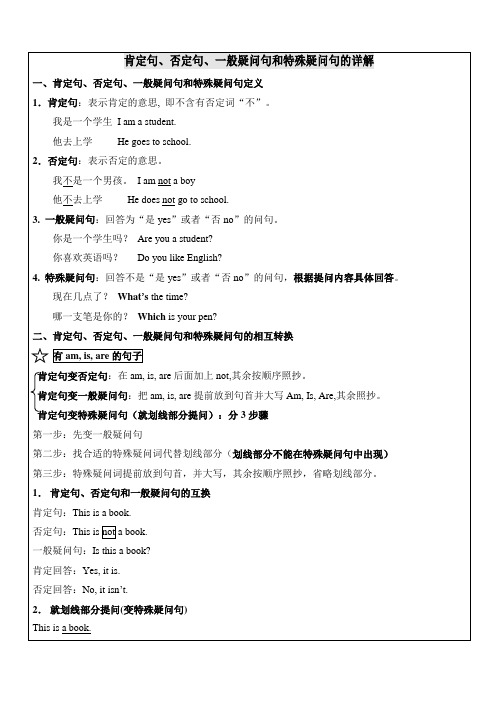
熟记变特殊疑问句时,容易判断错的情况。
1、 数词
表示年龄:He is fifty-five. How old is he ?
表示时间:It’s fifty-five. What’s the time?
表示加法:Six and two is eight. What’s six and two?
表示价格:The shirt is thirty yuan . How much is the shirt?
表示人:She’s Lucy’s sister. Who is she?
练一练 1 (用特殊疑问词填空):
1、A: _______ is the boy in blue?????????B:He’s Mike.
2、A: _______ wallet is it????????????? B:It’s mine.
表示距离:It’s five hundred metres away from here. How far is it from here?
表示长度:It’s five hundred metres. How long is it ?
4、 颜色,东西
表示颜色:The shoes are white. What color are the shoes?
第一步:变一般疑问句 Is this a book? 第二步:找合适的特殊疑问词 Is this what ? 第三步:特殊疑问词提前放到句首,并大写,其余按顺序照抄,省略划线部分。What is this?
没有 am, is, are 的句子
肯定句变否定句:在主语后面加上 do not 或者 does not,其余按顺序照抄动词用原形
2.and 变为 or
五年级英语一般疑问句和特殊疑问句知识精讲资料
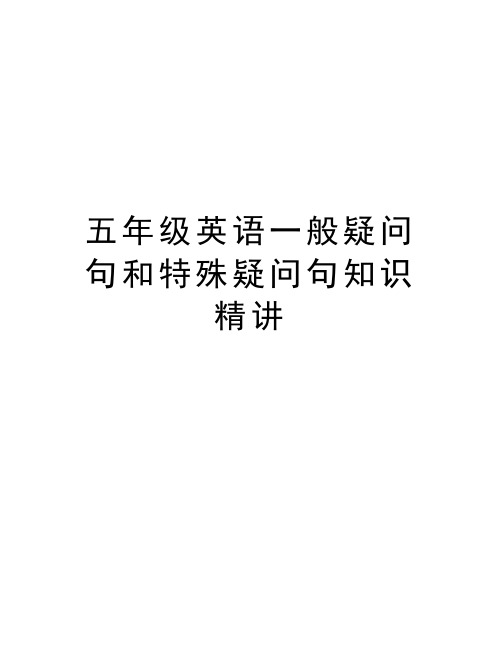
五年级英语一般疑问句和特殊疑问句知识精讲英语一般疑问句和特殊疑问句知识精讲一、一般疑问:1.含系动词be的一般疑问句的构成具体地说,am 只能跟在第一人称的单数 I 后面,are 搭配 you,is 跟在第三人称单数 he, she 后面.be 动词的基本意思:是.I'm in Class 2, Grade 1. →Are you in Class 2, Grade 1? 你是在一年级二班吗?(如遇第一人称,最好将其置换成第二人称)It's a map of China. →Is it a map of China? 这是一幅中国地图吗?Am I wrong again? (我又错了?)Yes, you are (wrong again). (是的,你又错了。
)No, you aren’t. (不,你没错。
)Is it your bicycle? (这辆自行车是你的吗?)Yes, it is. (是的,是我的。
)No, it isn’t. (不,那不是我的。
)2.含情态动词的一般疑问句的构成一般疑问句面前人人平等:情态动词与am / is / are一样,也可直接将它们提至主语前,所以问题迎刃而解了。
如:I can spell it. →Can you spell it? 你会拼写它吗?Shall I call a taxi for you ? (需要我替你叫一辆出租车吗?)Yes, please. Thank you. (好的,谢谢你。
) No, thank you.(不必了,谢谢你。
)Will you do that for her? (你愿意替她做那件事吗?)Yes, I will.(是的,我愿意。
)No, I won’t.(不,我不愿意。
)Can she drive? (她会开车吗?)Yes, she can.(是的,她会。
)No, she can’t.(不,她不会。
)3.含实义动词的一般疑问句的构成含实义动词的一般疑问句的构成稍微有点讲究,要在句首加do;如逢主语为第三人称单数,要在句首加does,并要将谓语动词变回原形(如has→have,likes→like等);有时陈述句中的some还要变作any等。
(完整版)小学英语四种基本句型肯定句否定句、一般疑问句与特殊疑问句
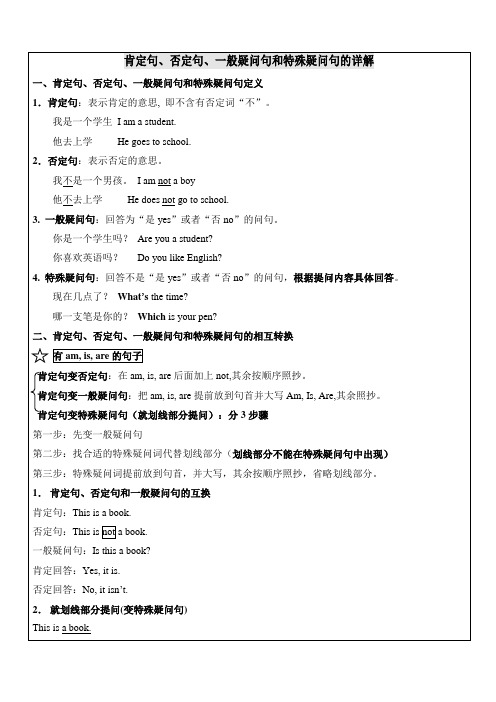
一、肯定句、否定句、一般疑问句和特殊疑问句定义 1.肯定句:表示肯定的意思, 即不含有否定词“不”。
我是一个学生 I am a student. 他去上学 He goes to school. 2.否定句:表示否定的意思。 我不是一个男孩。 I am not a boy 他不去上学 He does not go to school. 3. 一般疑问句:回答为“是 yes”或者“否 no”的问句。 你是一个学生吗? Are you a student? 你喜欢英语吗? Do you like English? 4. 特殊疑问句:回答不是“是 yes”或者“否 no”的问句,根据提问内容具体回答。 现在几点了? What’s the time? 哪一支笔是你的? Which is your pen? 二、肯定句、否定句、一般疑问句和特殊疑问句的相互转换 有 am, is, are 的句子 肯定句变否定句:在 am, is, are 后面加上 not,其余按顺序照抄。 肯定句变一般疑问句:把 am, is, are 提前放到句首并大写 Am, Is, Are,其余照抄。 肯定句变特殊疑问句(就划线部分提问):分 3 步骤 第一步:先变一般疑问句 第二步:找合适的特殊疑问词代替划线部分(划线部分不能在特殊疑问句中出现) 第三步:特殊疑问词提前放到句首,并大写,其余按顺序照抄,省略划线部分。 1. 肯定句、否定句和一般疑问句的互换 肯定句:This is a book. 否定句:This is not a book. 一般疑问句:Is this a book? 肯定回答:Yes, it is. 否定回答:No, it isn’t. 2. 就划线部分提问(变特殊疑问句) This is a book.
小学英语肯定句、否定句、一般疑问句和特殊疑问句地详解

小学英语肯定句、否定句、一般疑问句和特殊疑问句的详解一、be动词:am, is, are二、肯定句、否定句、一般疑问句和特殊疑问句定义1.肯定句:表示肯定的意思, 即不含有否定词“不”。
比如:我是一个学生 I am a student.他去上学 He goes to school。
2.否定句:表示否定的意思。
比如:我不是一个男孩。
I am not a boy他不去上学 He does not go to school.3. 一般疑问句:回答为“是yes"或者“否no”的问句。
比如:你是一个学生吗? Are you a student?你喜欢英语吗? Do you like English?4. 特殊疑问句:回答不是“是yes"或者“否no”的问句,根据提问内容具体回答.比如:现在几点了? What’s the time?哪一支笔是你的? Which is your pen?肯定句变否定句:在am, is, are后面加上not,其余按顺序照抄。
肯定句变一般疑问句:把am, is, are提前放到句首并大写Am, Is, Are,其余照抄。
肯定句变特殊疑问句(就划线部分提问):分3步骤第一步:先变一般疑问句第二步:找合适的特殊疑问词代替划线部分第三步:特殊疑问词提前放到句首,并大写,其余按顺序照抄,省略划线部分.注意:1如:Li ming 's not here today。
Who's not here today?今天谁没来?2例如:1.肯定句、否定句和一般疑问句的互换肯定句:This is a book。
否定句。
一般疑问句:Is this a book?肯定回答:Yes, it is.否定回答:No, it isn't。
2.就划线部分提问(变特殊疑问句)This is a book。
第一步:变一般疑问句 Is this a book?第二步:找合适的特殊疑问词 Is this what ?特殊疑问词提前放到句首,并大写,其余按顺序照抄,省略划线部分。
(完整版)小学英语四种基本句型-肯定句、否定句、一般疑问句与特殊疑问句

一般疑问句:Do you like English? 否定句:I do not like English. 单三 肯定句:He likes English. 一般疑问句:Does he like English? 否定句:He does not like English.
1. 肯定句、否定句和一般疑问句的互换 肯定句:This is a book. 否定句:This is not a book. 一般疑问句:Is this a book? 肯定回答:Yes, it is.
第 1 页,共 11 页来自否定回答:No, it isn’t.
2. 就划线部分提问(变特殊疑问句) This is a book. 第一步:变一般疑问句 Is this a book? 第二步:找合适的特殊疑问词 Is this what ? 第三步:特殊疑问词提前放到句首,并大写,其余按顺序照抄,省略划线部分。What is this?
14、A:_______ do you have dinner? B: At 6 o’clock
练一练 2:
1、 It’s a book. (改一般疑问句)
2、 My father is in the study. (对划线部分提问)
3、 Do you watch TV every Sunday? (做肯定回答)
选择 反意
用于提出问题 用于提出问题
? Is your friend a boy or a girl? It's a fine day, isn't it?
?
祈使句 感叹句
表示命令或请求、建议
(完整版)小学英语一般疑问句和特殊疑问句(附练习题)

一、一般疑问句1、定义 : 用 Yes 或 No 作答的疑问句叫一般疑问句。
2、特色:1、以 be 动词、助动词或神态动词开头;例:Is your father a teacher? Does Tom like apples? Can Jenny speak English? 2、常常读升调3、陈说句变为一般疑问句的方法:1> 看陈说句中有没有be 动词(am、is、 are、 was、 were)或神态动词( can),假如有,将其提到句首,句末打上问号即可。
例: It was rainy yesterday.→Was it rainy yesterday?Tom's father can play the piano.→Can Tom's father play the piano?2>假如句中没有 be 动词或神态动词,句首加do 的相应形式( do、does、did),且原句的谓语动词要变回原形。
1.They go to school by bike.→ Do they go to school by bike?2.Bill gets up at 6:30 every day.→ Does bill gets up at 6:30 every day?3.The students saw a film yesterday.→ Did the students see a film yesterday?注: 1.假如陈说句中有第一人称,则变问句时要变为第二人称。
I usually have lunch at school.→ Do you usually have lunch at school?2.假如陈说句中有some, 则变问句时常常要变为any 。
There is some water on the playground. → Is there any water on the playground4、一般疑问句的回答。
小学英语肯定句、否定句、一般疑问句和特殊疑问句地详解
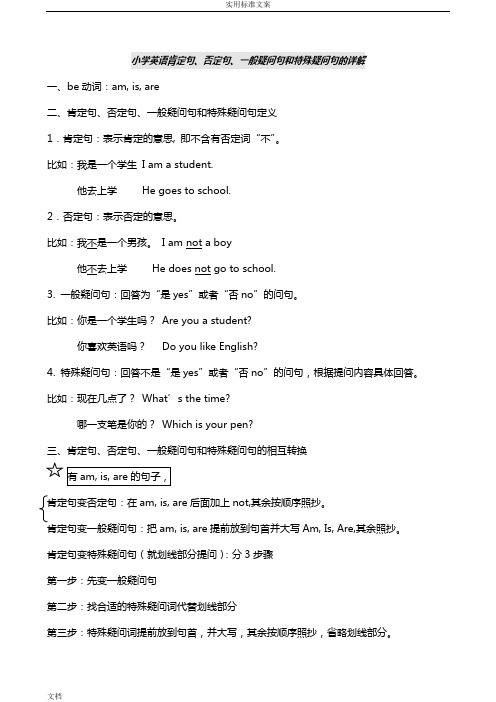
小学英语肯定句、否定句、一般疑问句和特殊疑问句的详解一、be动词:am, is, are二、肯定句、否定句、一般疑问句和特殊疑问句定义1.肯定句:表示肯定的意思, 即不含有否定词“不”。
比如:我是一个学生I am a student.他去上学He goes to school.2.否定句:表示否定的意思。
比如:我不是一个男孩。
I am not a boy他不去上学He does not go to school.3. 一般疑问句:回答为“是yes”或者“否no”的问句。
比如:你是一个学生吗?Are you a student?你喜欢英语吗?Do you like English?4. 特殊疑问句:回答不是“是yes”或者“否no”的问句,根据提问内容具体回答。
比如:现在几点了?What’s the time?哪一支笔是你的?Which is your pen?三、肯定句、否定句、一般疑问句和特殊疑问句的相互转换肯定句变否定句:在am, is, are后面加上not,其余按顺序照抄。
am, is, are提前放到句首并大写Am, Is, Are,其余照抄。
肯定句变特殊疑问句(就划线部分提问):分3步骤第一步:先变一般疑问句第二步:找合适的特殊疑问词代替划线部分第三步:特殊疑问词提前放到句首,并大写,其余按顺序照抄,省略划线部分。
注意:1.如:Li ming 's not here today. Who's not here today? 今天谁没来?2.划线部分不能在特殊疑问句中出现。
例如:1.肯定句、否定句和一般疑问句的互换肯定句:This is a book.否定句:一般疑问句:Is this a book?肯定回答:Yes, it is.否定回答:No, it isn’t.2.就划线部分提问(变特殊疑问句)This is a book.第一步:变一般疑问句Is this a book?第二步:找合适的特殊疑问词Is this what ?第三步:特殊疑问词提前放到句首,并大写,其余按顺序照抄,省略划线部分。
小学英语肯定句、否定句、一般疑问句和特殊疑问句的详解

小学英语肯定句、否定句、一般疑问句和特殊疑问句的详解一、be动词:am, is, are二、肯定句、否定句、一般疑问句和特殊疑问句定义1.肯定句:表示肯定的意思, 即不含有否定词“不”。
比如:我是一个学生 I am a student.他去上学 He goes to school.2.否定句:表示否定的意思。
比如:我不是一个男孩。
I am not a boy他不去上学 He does not go to school.3. 一般疑问句:回答为“是yes”或者“否no”的问句。
比如:你是一个学生吗? Are you a student?你喜欢英语吗? Do you like English?4. 特殊疑问句:回答不是“是yes”或者“否no”的问句,根据提问内容具体回答。
比如:现在几点了? What’s the time?哪一支笔是你的? Which is your pen?肯定句变否定句:在am, is, are can后面加上not,其余按顺序照抄。
肯定句变一般疑问句:把am, is, are can提前放到句首并大写Am, Is, Are,其余照抄。
特别注意有I We 改为YOU,Are you 问 Iam 或we are 答Are you a teacher? Yes,I am. Are you students? Yes,we are.2.非单三时用do, 单三时用does肯定句:I like English.否定句:单三肯定句:He likes English.like English?否定句:like English.3.动词过去式的句子分两类,was\were 和动词过去式有 was,were 改为否定句,直接在后面加 not ,改为一般疑问句把was were 直接提前,有 I we 改为 youI was a teacher.I was not a teacher.Were you a teacher?Yes,I was.有动词过去式,改为否定句加didn’t ,过去式还原。
- 1、下载文档前请自行甄别文档内容的完整性,平台不提供额外的编辑、内容补充、找答案等附加服务。
- 2、"仅部分预览"的文档,不可在线预览部分如存在完整性等问题,可反馈申请退款(可完整预览的文档不适用该条件!)。
- 3、如文档侵犯您的权益,请联系客服反馈,我们会尽快为您处理(人工客服工作时间:9:00-18:30)。
英语一般疑问句和特殊疑问句知识精讲一、一般疑问:1.含系动词be的一般疑问句的构成具体地说,am 只能跟在第一人称的单数 I 后面,are 搭配 you,is 跟在第三人称单数 he, she 后面.be 动词的基本意思:是.I'm in Class 2, Grade 1. →Are you in Class 2, Grade 1? 你是在一年级二班吗?(如遇第一人称,最好将其置换成第二人称)It's a map of China. →Is it a map of China? 这是一幅中国地图吗?Am I wrong again? (我又错了?)Yes, you are (wrong again). (是的,你又错了。
)No, you aren’t. (不,你没错。
)Is it your bicycle? (这辆自行车是你的吗?)Yes, it is. (是的,是我的。
)No, it isn’t. (不,那不是我的。
)2.含情态动词的一般疑问句的构成一般疑问句面前人人平等:情态动词与am / is / are一样,也可直接将它们提至主语前,所以问题迎刃而解了。
如:I can spell it. →Can you spell it? 你会拼写它吗?Shall I call a taxi for you ? (需要我替你叫一辆出租车吗?)Yes, please. Thank you. (好的,谢谢你。
)No, thank you.(不必了,谢谢你。
)Will you do that for her? (你愿意替她做那件事吗?)Yes, I will.(是的,我愿意。
)No, I won’t.(不,我不愿意。
)Can she drive? (她会开车吗?)Yes, she can.(是的,她会。
)No, she can’t.(不,她不会。
)3.含实义动词的一般疑问句的构成含实义动词的一般疑问句的构成稍微有点讲究,要在句首加do;如逢主语为第三人称单数,要在句首加does,并要将谓语动词变回原形(如has→have,likes →like等);有时陈述句中的some还要变作any等。
如:She lives in Beijing. →Does she live in Beijing? 她住在北京吗?I like English. →Do you like English? 你喜欢英语吗?There are some books on my desk.→Are there any books on your desk? Do you speak Japanese? (你会说日语吗?)Yes, I do.(是的,我会说。
)No, I don’t.(不,我不会说。
)Does she swim very well?(她游泳游得好吗?)Yes, she does. She is a good swimmer.(是的,她游得好。
她是游泳高手。
)No, she doesn’t. She doesn’t swim at all.(不,她不会。
她根本不会游泳。
)Did you tell her the truth? (你向她说了实话吗?)Yes, I did.(是的,我说了。
)No, I didn’t.(不,我没说。
)Don’t you like to have a cup of coffee?(你不喜欢喝一杯咖啡吗?)Yes, I do.(要,我要一杯。
)No, I don’t. Thank you. (不,我不要。
谢谢你。
)二、特殊疑问句特殊疑问词wh-开头外加能与之结伴同行的名词; how及它的形容词兄弟姐妹们,即如:what, where, which, what class, what time, what number; who, whom, whose,how,how many, how old, how much等。
1. 特殊疑问句的构成特殊疑问句由"特殊疑问词+一般疑问句"构成:How old are you? 你多大了?What's this in English? 这个用英语怎么讲?但特殊疑问句有时也要"特殊解":即如果问的是主语或主语的定语时,这时的特殊疑问句看起来成了"特殊疑问词(+主语)+陈述句"。
如:Who's not here today? 今天谁没来?·Which pen is red? 哪枝钢笔是红色的?5.对特殊疑问句的答复小扫描疑问代词用于特殊疑问句中,疑问代词一般都放在句首,并在句中作为某一句子成分。
如:What is this? (what作表语)这是什么?what color is it ? 什么颜色?Which is bigger, the left one or the right one? (which作主语)哪一个大一点,左边的一个还是右边的一个?What are you talking about? (what作宾语)你在说什么?Who will go with you? (who作主语)谁和你一起去?Whom are you talking to? (whom作宾语)你在跟谁说话?Whose dictionary is this? (whose作定语)这是谁的字典?What's the capital of your country? 贵国首都是哪儿What's your motherland? 你祖国是哪儿?回答特殊疑问句,不能用"yes / no";但可用"到什么山上唱什么歌"来形容对特殊疑问句的应答- -即问什么答什么(尤其是简略回答更明显)。
如:-How old is your sister? 你妹妹今年多大了?-She's only five. / Only five. (她)才5岁。
询问天气。
“How +be +the weather...?”与“What +be +the weather like...?”意思相同。
例如:How is the weather today? = What's the weather like today? 今天天气如何?eg. two hundred sheep→How many sheepHow much is the computer? = How much does the computer cost? = What's the price of the computer? 这台电脑的价格是多少?eg. I've worked in that factory for two years. (划线提问)______ _____ _______ you worked in that factory?How heavy is that basket of apples? = What's the weight of that basket of apples? 那筐苹果有多重?注意:与what 句式转换时,how 后的形容词heavy, wide, high, tall, deep, long, fast, large等,须分别转换成对应的名词:weight, width, height, depth, length, speed, size等。
其中How tall are you?与What's your height?How often do you visit your grandma?eg. did he call you the day before yesterday? Twice.A.What timeB.How many timesC.How muchD.How longeg. Jane and her brother will finish the work in two hours. (划线提问)_____ _____ _____ Jane and her brother finish the work?eg. It's about two kilometres from here to the country.(划线提问)______ _____ _____ _____ from here to the country?对人口的提问,What's the population of Germany?德国的人口有多少?population 表示“人口”是一集体名词,have population of 表示“有多少人口”。
例如:Our village has population of two hundred of people.我们村有二百人口。
What's the population of...?”可与“How large is the population of...?”互相转换。
例如:What's the population of the world? = How large is the population of the world? 世界人口是多少?注意:在把肯定句改成否定句或一般疑问句的时候,要注意句中是否有already、some、something、somebody等词,如果有也必须进行改变,already要改成yet,some、something、somebody等分别改成any、anything、anybody等。
(疑问句表示请求,建议时应用some.不是any)另外,在改成否定句的时候注意把too改成either,both改成neither,all改成none等.在改成一般疑问句的时候,常常把第一人称I、we改成第二人称you。
III.专项训练馆。
按要求进行句型转换。
①Mary is at home. (对划线部分提问)③We're in the same class. (改成一般疑问句并作否定回答)④My English teacher is Miss Hu.(对划线部分提问)⑤The twins are twelve now. (改成一般疑问句并作肯定回答)。
